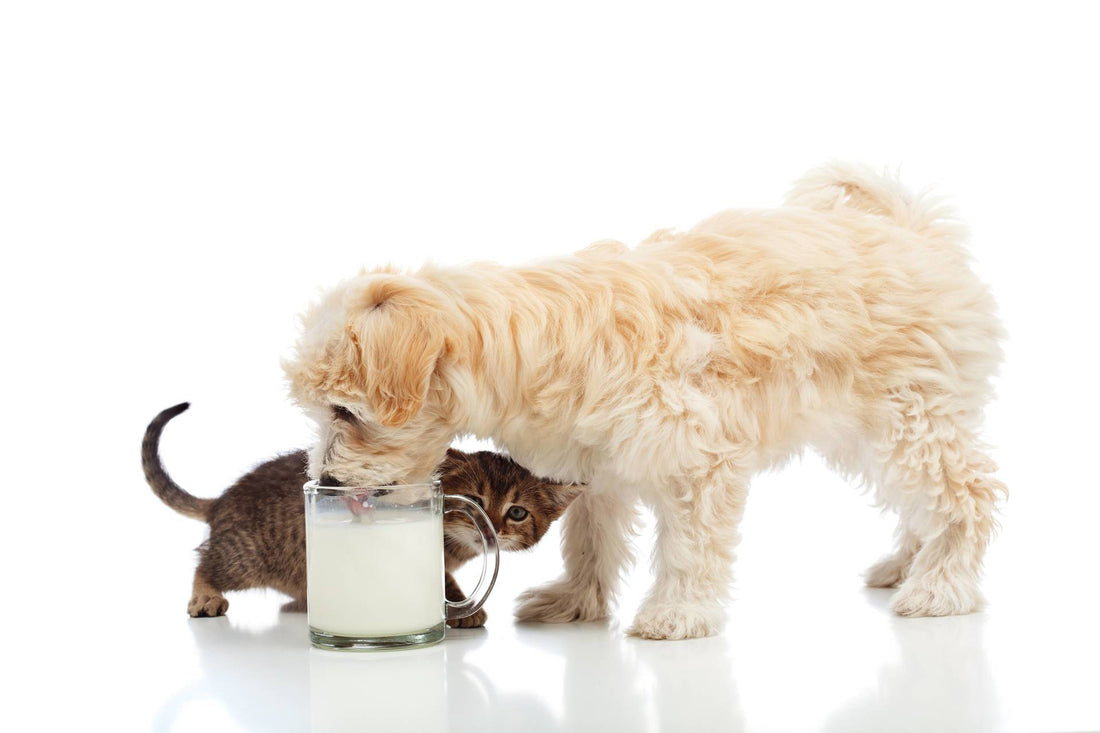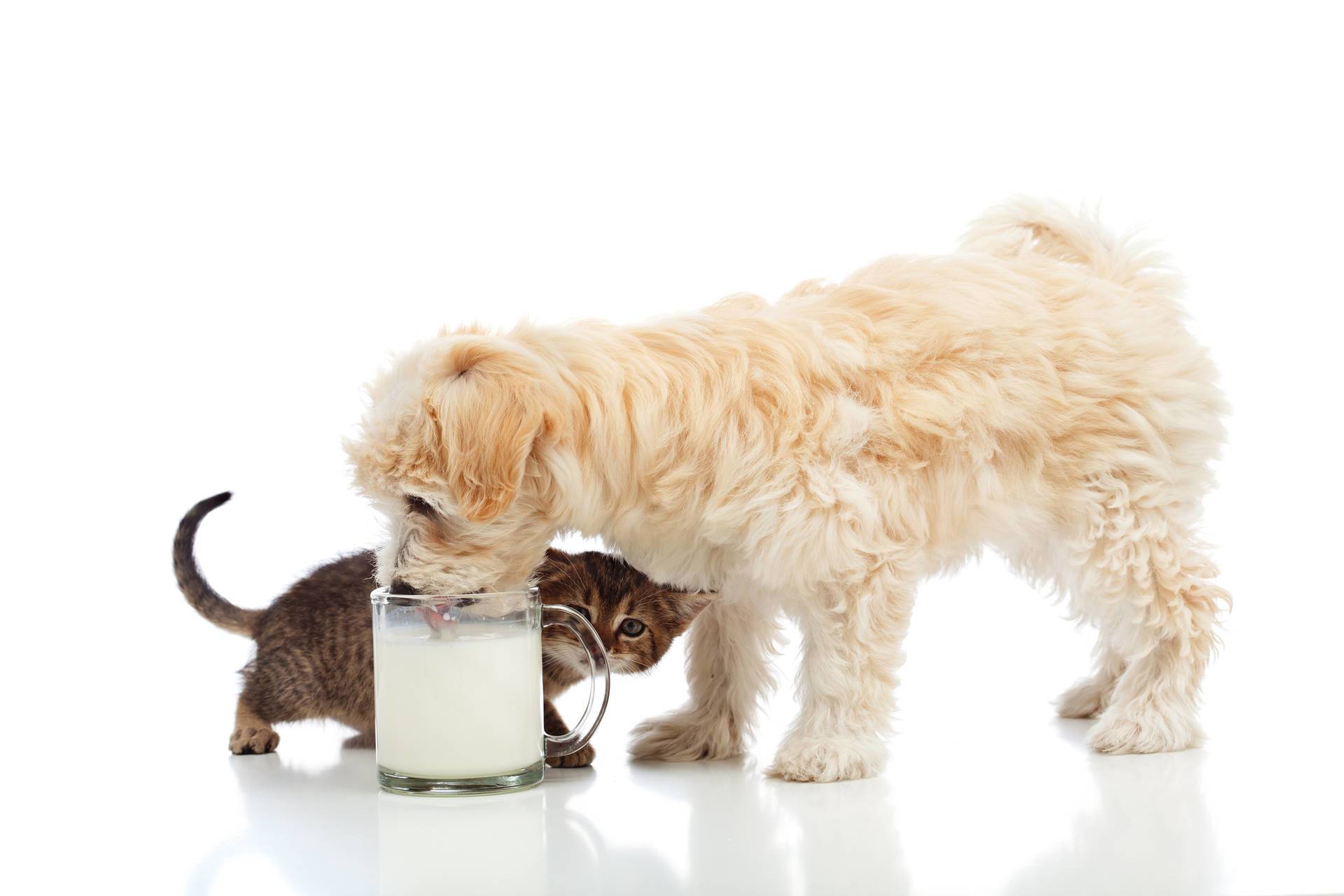
What About Lactose Intolerance in Dogs and Cats
Michelle at Vet Organics Tags: Cats (85)date_January_2018 (3)Dog Nutrition (54)A common depiction of happy kittens is one where they’re lapping up milk from a saucer. It’s in children’s books, vintage posters, commercials, and artwork. Because of this, few people realize that cats are actually lactose intolerant, and so are most dogs.
What is lactose intolerance in dogs and cats?
 People and animals produce lactase, which is how we break down dairy into simple sugars that are easily digested. Once weaned, cats and dogs don’t need to produce it anymore, so they gradually become lactose intolerant. Without the enzyme, milk remains undigested. Undigested sugar draws water into the intestines, which results in diarrhea. They also cause bloating and flatulence because the bacteria in our gut will cause fermentation. It’s a pretty uncomfortable process for everyone, and it’s worse for some than for others. The most common symptoms are diarrhea, gas, and bloating, but intolerance can also cause nausea and vomiting, which can lead to dehydration
People and animals produce lactase, which is how we break down dairy into simple sugars that are easily digested. Once weaned, cats and dogs don’t need to produce it anymore, so they gradually become lactose intolerant. Without the enzyme, milk remains undigested. Undigested sugar draws water into the intestines, which results in diarrhea. They also cause bloating and flatulence because the bacteria in our gut will cause fermentation. It’s a pretty uncomfortable process for everyone, and it’s worse for some than for others. The most common symptoms are diarrhea, gas, and bloating, but intolerance can also cause nausea and vomiting, which can lead to dehydration
What can cats have in place of dairy?
 Cat’s can’t taste sweets, yet so many enjoy a little nibble of ice cream. Check out this article for more about How Cats Taste Their Food . It’s thought that they may enjoy the texture of many dairy products, but there isn’t much in it for them when it comes to nutrition. Instead, cats should always have fresh, clean water available to them. Well-balanced and nutritionally sound cat food is where they should be getting their calories. For those of us who want to offer a little milk as a treat every once in a while, lactose-free cat milk is the best choice. Cat milk isn’t common, but can be found at some smaller pet supply stores and sometimes online.
Cat’s can’t taste sweets, yet so many enjoy a little nibble of ice cream. Check out this article for more about How Cats Taste Their Food . It’s thought that they may enjoy the texture of many dairy products, but there isn’t much in it for them when it comes to nutrition. Instead, cats should always have fresh, clean water available to them. Well-balanced and nutritionally sound cat food is where they should be getting their calories. For those of us who want to offer a little milk as a treat every once in a while, lactose-free cat milk is the best choice. Cat milk isn’t common, but can be found at some smaller pet supply stores and sometimes online.
What can dogs have in place of dairy?
More cats are lactose intolerant than dogs, but repeated gastrointestinal distress in dogs can trigger food allergies that result in severe skin irritation and serious diseases like pancreatitis. The only way to treat intolerance or allergies is to remove the irritant, which means no more dairy.
 Dairy holds no nutritional value for dogs, but small dairy alternative treats are OK. For a nutritionally sound dog diet that’s tasty for dogs and is free of the additives and fillers of commercial dog food,
Dairy holds no nutritional value for dogs, but small dairy alternative treats are OK. For a nutritionally sound dog diet that’s tasty for dogs and is free of the additives and fillers of commercial dog food,
EcoEats is the answer.
And for an occasional snack in place of dairy, we can offer a little lactose-free milk and dairy. Some soy products are generally safe, but too much can lower thyroid levels because of the increased estrogen. Almond milk is OK in small amounts. Too much of any of these will still cause the similar gastrointestinal distress because of the fat content. Just make sure there are no added sweeteners or flavorings. And read the label to avoid other additives that may be dangerous for our canine companions. Be especially careful to watch for xylitol, which is deadly for our furbabies. 
It’s understandable that our cat and canine companions would feel like dairy is a familiar treat, maybe even a comfort food. But the discomfort and distress it will cause most of them isn’t worth it. Not to mention, we’re all made to suffer when our furbabies get gassy. Lactose intolerance in dogs and cats can lead to more serious problems down the road when it's repeatedly aggravated by feeding them dairy products. Feline flatulence and rumbly pup tummies are disruptive to the whole family, but diabetes and pancreatitis are even worse.
